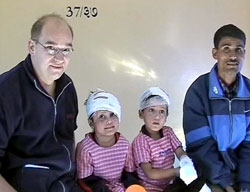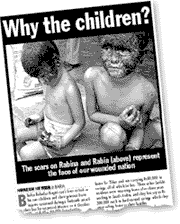 "It all seems like a dream to me," says Bhakta Bahadur Regmi as he watches his children Rabina and Rabin playing in the hospital garden. Bhakta Bahadur had just arrived with his children on Saturday at the Sushma Koirala Memorial Hospital (SKMH) in Sankhu after a six-hour ride from Simara.
"It all seems like a dream to me," says Bhakta Bahadur Regmi as he watches his children Rabina and Rabin playing in the hospital garden. Bhakta Bahadur had just arrived with his children on Saturday at the Sushma Koirala Memorial Hospital (SKMH) in Sankhu after a six-hour ride from Simara.
There has been overwhelming support for the Regmi family since this tragic story was first reported ("Why the children?" #121), and the SKMH offered free treatment. Rabina and Rabin were badly burnt in a Maoist arson attack on their bus on 4 November near Malangwa. Bhakta Bahadur's wife, Anju, was among three passengers who died in the incident. The children have still not been told of their mother's death.
When Dr Andreas Settje of SKMH read the story, he was so touched that he got the hospital to offer free treatment no matter how long it takes. "I felt really upset after reading their story. I've come across a lot of severe cases like this. But the history of this case is very tragic," Settje told us.
Individual donations through the human rights organisation INSEC for Rabina and Rabin's expenses and rehabilitation have reached nearly Rs 50,000. Many of the contributions came from school children. "When I read the story I couldn't stop crying," recalls Sarah Neupane, of Class 11 at St Mary's School. "We thought we could contribute, so we made copies of the article and distributed it." Neupane's effort raised Rs 5,000 from her
classmates.
"The story of Rabin and Rabina shows the impact of the meaningless war and the suffering that the Nepalis, especially children, are going through," said another contributor, Meena Shrestha from Bijuli Bazaar.
 Bhakta Bahadur thinks god has answered his prayers, and is thankful that fellow-Nepalis have responded so immediately and generously to his family's tragedy. He had no one else to turn to, and was getting increasingly worried about whether his children would recover fully.
Bhakta Bahadur thinks god has answered his prayers, and is thankful that fellow-Nepalis have responded so immediately and generously to his family's tragedy. He had no one else to turn to, and was getting increasingly worried about whether his children would recover fully.
In the wards of the Sankhu hospital, Rabin and Rabina have already become the most-popular patients. Doctors and nurses given them full attention, other patients and even total strangers hug and talk to them in the garden. Settje says the burns are serious, and besides guarding against infection the treatment will include skin grafts, orthopedic surgery of the fingers as well as psychological counseling for another six weeks.
Four-year-old Rabin is now bored of staying in bed, and likes hopping around the hospital compound while his nurse runs after him. Six-year-old Rabina looks cheerful, looks carefully after her brother, and can be seen in animated conversation with the friends she has already made among other patients.
At INSEC, activists say they were happily surprised with the overwhelming support from Nepal and abroad. "It has inspired us to introduce a whole new approach to self-help," says Kabita Aryal who heads the Children's Programme at INSEC. "As a human rights organisation we cannot reach every victim, but we have seen that
media can play a role in highlighting the senselessness of violence."
INSEC will hand over the collection to a bank account in the name of Rabina and Rabin Regmi next week. Contributors so far:
1. Shota and Julie Kamishima (Rs 10,000) 2. Lincoln School Community Service Class of 2002 (Rs 10,000) 3. Anonymous (Rs 5,000) 4. Rita Bhandary (Rs 5,000) 5. St Mary's School students (Rs 5,000) 6. Nabil Bank staff: Binaya Regmi, Kapil Sharma, Bishnu Acharya, Bikash Mishra, Prabin Chettry, Sundar Kadel, Bhuvan Dahal, Pradeep Bista (Rs 3600) 7. Anne Erpelding (Rs 3,000) 8. Staff of Nepal Bangladesh Bank, Janakpur (Rs 2,500)
9. Meena Shrestha, Bijuli Bazar (Rs 2,000) 10. Hanna Battisti and Thomas Benedikter (Rs 1,000) 11. Pushkar Dangol, Balaju (Rs 500)


